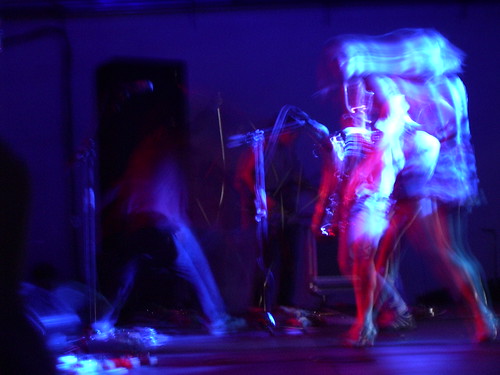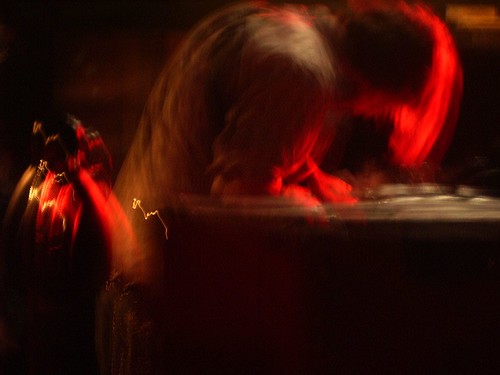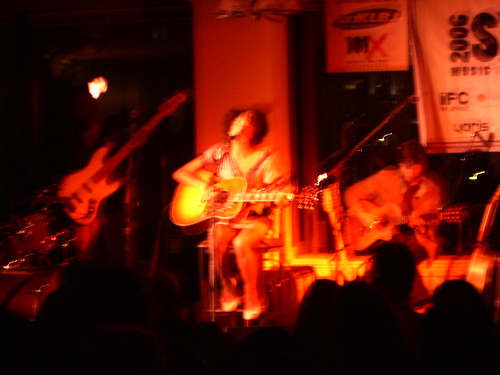[this piece ran as a cover story in Kerrang! in 2003]
You’d not imagine rock’n’roll abounding in the cold, bare environs of West London’s Sanctuary photographic studio. Stark and sparse, its a blank canvas littered with scruffily paint-splattered step-ladders, ominously-humming power-points, and a strangely antiseptic dressing room with illuminated mirrors like you might imagine a pantomime Widow Twankey using to apply his/her make-up. Funnily enough, our subjects this afternoon are practitioners of a similarly camp and particularly English brand of showbiz.
The Darkness stroll in, at once at odds with any accepted sense of ‘cool’ and yet exceedingly, utterly rock’n’roll, a seemingly-contrary stance they wear well. There’s drummer Ed Graham, sad-eyes painted with mascara, his hulking, skin-pummeling frame jarring sweetly with the girlishness of his make-up. There’s Frankie Poullain, jaunty mustache, bandana and golden earring suggesting he was a pirate on the open waves in a previous life.
And then there are the Hawkins brothers, guitarist Dan and singer/guitarist Justin. Dan exudes easy rock cool, in his audaciously flared cords, skinny torso, long golden hair. Justin’s like a slightly more awkward echo, a comedian’s faux-clumsiness lurking within his swagger, but he too looks utterly ‘rock’n’roll’ – in an antique, faded Aerosmith baseball tee, cut short so it finishes an inch or so above his unbelievably tight blue jeans, neatly showing off the neon plumes of fire flickering in tattooist’s ink up his lean, tanned abdomen.
All four men look striking, pleasingly odd – like they’ve been carved in some forgotten rock-god’s image, when those who struck instruments and wailed into the night sky seemed like another species altogether, before punk-rock made stars of scruffy mortals with a couple of chords at their fingertips. Offstage, they seem strangely earthbound, like they’re ill-at-ease without guitars strapped to them, without their animal-print catsuits or several trillion decibels of raw metallic noise to soothe their spirits. But onstage… well. That’s a very different story.
They’re still kicking triumphant traces of Donnington Download mud from their cowboy boots as they walk in, copies of Kerrang! proudly folded open to the festival review. “We’re described as lanky, but I’ve got really short legs,” notes Justin. “I’m the shortest member of the band, 5’11”.”
“We’re one of the tallest bands in rock history,” grins Dan, continuing. “Ed’s six foot. Frankie’s six two and a half.”
“I don’t think of us in terms of height, but width. Girth,” leers Frankie, filthily. “That was one of our rejected album titles, ‘Never Mind The Quality, Feel The Girth’. ‘Short Fat Cock’, that was another one.”
“People who are shorter tend to adopt a certain ‘Napoleon’ complex,” reasons Justin, a man who bullshits with flair and passion, amid a din of guffaws. “The prima donnas tend to be the shorter stars, the Princes, the Jon Bon Jovis… That’s why they yearn to be onstage, to extend their perceived manhood. As it were. But, as you can see, it’s not something we have to worry about.”
Indeed. Their brilliant debut album more reasonably titled ‘Permission To Land’ and readied for release, their live show entering the orbit of the enormodome, their helium-huffing and preposterous, platinum rock songs… The Darkness are about to become Very Big Indeed, and it’s not something they – or you – need worry about whatsoever.
In the beginning, there was The Darkness…
Well, no, of course there wasn’t. In the beginning, there was the uncool, the painful prehistory before the Hawkins brothers’ nascent dreams of rock stardom made any sense or semblance of ever coming true.
“Before this band, Dan and I couldn’t see eye to eye with each other over anything,” remembers Justin. “We certainly couldn’t have played together in a band. I was a bit of a geeky rocker. Dan’s always had a bit more of a ‘cool’-ness about him. He probably had no desire to be in a band with me because I was such a twat. I think those are the same reasons its working so well now, but in the past, we couldn’t even communicate.”
There’s a likeable, typically-British awkwardness to Justin. He’s hyper and glam like Dave Lee Roth, but with a little Basil Fawlty and Goon Show eccentricity in there too. If Dan is a natural rock’n’roll star in the Keef Richards, unimpeachably-cool mode, Justin’s naturally, irresistibly comical, given to bursts of naughty toilet humour when it suits him; you don’t doubt stashed somewhere in his house is, say, the full set of Bottom videos (“You could use the Big Bang theory if you like, but its more like a long slow emission of gas which eventually explodes,” he says, of their success). He’s a misfit, always has been, and is comfortably proud of it.
“Ever since I was at school, I’ve always chosen to listen to stuff that everyone else thought wasn’t cool,” he continues. “It feels a bit more personal to me. I was listening to Aerosmith, Van Halen and AC/DC, wearing my Steve Tyler scarves; everyone else thought I was a twat or a ‘Greb’. I was not actually a popular child. I think one of the reasons I’ve become such a shit-hot guitar player is not having the option of sitting under the pier and taking drugs with the cool kids; I was in my bedroom playing guitar like a motherfucker. It’s worked out for me now, so I’m not bitter in any way. But I think that goes some way to explaining who I am.”
For all their star-gazing flamboyance, The Darkness are a fearsomely-driven band. When other groups would mosey down to the pub, they rehearse. They’re always writing new material, honing their stagecraft, planning their next step. They’re also at least as fearless as they are shameless (have you seen some of Justin’s costumes?).
“I think the ‘balls’ element is key here,” says Dan. “Justin and I did fantastically at school; at GCSES, we got straight As. Justin did one year of A-Levels, was a straight A student. Halfway through his course, he just said ‘Fuck this, I’m off’. He buggered off to Huddersfield to knock around a studio up there for a year or too. At that point, I was about to leave school. I just thought, fuck this, my grades are all really good but I don’t want to do this anymore. Luckily my parents were understanding enough to let us try for what we wanted…”
The interaction between these two brothers is, in fact, very sweet, despite whatever tensions Justin alludes to. While Dan’s definitely not the type to suffer fools gladly, inherently practical and no-nonsense in outlook, he seems deeply fond of his brother’s eccentricities and comedic bent. Justin might gladly fool around, gadding about the studio later in a variety of costumes playing the good-natured clown while Dan, dressed in black shirt and trousers, merely riffs and solos on his guitar, but there’s also a sense that Dan looks up to his elder brother (“By three months,” winks Justin). He made the first blind leap towards his dreams all those years ago, and Dan obviously still draws strength from his brother’s fearlessness.
The Hawkins house in Lowestoft was a hive of keen music enthusiasts. Ma and Pa Hawkins kept their boys pumped full of great music, a menu that included, according to Justin, “Queen, Fleetwood Mac, and a helluva lotta reggae!” Of course, the Darkness’s glammed-up and hook-laden fruits haven’t fallen far from the classic-rock tree, but they’re not blind in their love for their idols.
“A lot of my guitar style is influenced by Brian May,” offers Justin, “but the way he’s butchered the Queen back catalogue would make Freddie wince.”
Have you seen the play?
“No,” he answers. “I will not see… that. Ben Elton’s got fuck all to do with music. If he did that to my songs, I’d come and haunt him, I’d come back from the grave and fuck him in the eye.
“I blame Brian, whether it was his decision or not. He allows people like 5ive to cover ‘We Will Rock You’. That’s wrong, for a start. And then Brian said, ‘Well, instead of having one fantastic singer, we’ve now got five fantastic singers!’ Fuck off, Brian.”
What about when he stood on top of Buckingham Palace for the Jubilee last year?
“I’ve got to say, that fucking kicked arse,” interrupts Dan. “That’s what he’s here for, fucking standing on top of fucking Buckingham Palace, playing a wicked fucking solo with half the world watching. Fucking genius. He just makes very poor business decisions, and he’s ruining his fucking catalogue. Sorry Brian.
“It’s weird, people think we’ve got our heads perpetually stuck in rock biographies, that we’re in awe of these people. I couldn’t give a flying fuck. It’s the music that I’m into. There’s nothing more fun than playing guitar in front of a shitload of Marshals, playing enormous riffs. People think we actually plan the way we sound, that there’s some kind of preconceived agenda. There so isn’t, we just get together and do what the fuck we want. Like, you’re not allowed to play ‘Smoke On The Water’ in a guitar shop, which is always the first fucking thing I do when I try a guitar out. It turns us on, doing stuff we’re not allowed to do.”
The ‘stuff we’re not allowed to do’ Dan is referring to there is, presumably, The Darkness’s penchant for rocking hard without descending into angsty posturing, making them glorious misfits in a rock landscape which has, since the Year Zero that was Nirvana’s ‘Nevermind’, chosen misery over the kind of celebratory sounds reverberating through ‘Permission To Land’. Think of the lineage of rock figureheads since Kurt tragically left this world, and you’ll come up with a slew of lesser complaint-rock bards all venting their tortured souls and tempered tantrums, evidence of a seismic shift in a music that was once all about dumb, heady celebration but now lingers in a morbid earthbound gloom. Fret not, though; The Darkness have come to deliver us from, uh, the darkness.
The first rumblings came last year, with their ludicrously brilliant, and brilliantly ludicrous ‘I Believe In A Thing Called Love’ single, a deliciously addictive blast of metallic soprano that packed all the glitter and pizzazz of their swiftly-legendary live shows into its four minutes of poperatic madness. Then, the controversial ten-page feature in style mag Dazed & Confused, which the band are still, of a fashion, living down.
“The whole point of that feature was, don’t forget there are people like these who will probably never make it, but that’s not gonna stop ‘em from toiling,” grins Justin, relaxing with is bandmates out in the sun-bathed parking bay beside the studio.
Their flamboyance, their choice of influences and their brilliant stageplay (early shows saw Justin hurling his sweaty tee shirts to fans; “It makes it special for one person every night,” he explains) saw them written off as an ironic joke by a music industry grown fat off the gloom-rock cashcow. “We’ve given up trying to understand that, to be honest,” puzzles Justin. “We’ve chalked it up to jealousy, sexual inadequacy, all sorts of things, really.”
But when their second single, ‘Get Your Hands Off Of My Woman Motherfucker’, scored chart success despite no marketing or promotional push and, obviously, scant radioplay, the industry belatedly began to take notice. Frankie takes great pleasure quoting the backtracking of various big-name insiders on the issue of The Darkness’s burgeoning stardom, and you get the impression The Darkness are going to savour their last laugh. Now they rock out on kids’ Saturday morning TV shows, the new single ‘Growing On Me’ clings to the radiowaves like catsuit-clad bunting, and all kinds of high-profile festival slots are planned for the summer.
They’ve swiftly become a byword for rock’n’roll done right; “At Brighton, this woman brought her ten your old son up afterwards and told us she wanted his first rock show to be a proper one. ‘I wanted you to pop his rock cherry’, she said,” laughs Justin. “‘You’re the best men for the job!’”
Later, dressed in his leopard-print catsuit (he has several, and can choose between the different catskins like an experienced furrier), Justin will sprawl in an utterly lascivious fashion on the floor before his band, illuminated by camera-flash and shutter-whirr, springing back up intermittently and rubbing the calves twisted in agony by his posing, but returning every time to his unnatural and – to anyone not gifted with so balletic a form – unattainable stance. He’s like an old-school showbiz trouper, and no stretch is too far to make his rock’n’roll dreams come true. It’s hard work, they admit, but they enjoy every minute of it, and the larger this thing gets, the more it seems to suit them. Rock’n’roll, they insist, isn’t just better than ‘real’ life; it’s easier too.
“Coming off tour is probably the worst thing about being in a band,” sighs Dan.
“Because at that point you have to remember how to cross roads and use public transport and everything like that,” adds Justin, dripping Freddie Mercury camp. “You don’t have somebody doing everything for you and wiping your arse for you.”
“Also, you haven’t got a rider,” continues Dan, sweetly useless in that way only true rock’n’roll stars can pull off. “You have to fill that fridge up yourself, and life begins to get really expensive.”
And that about sums up the extent of the bitching within The Darkness camp, bemoaning the endless hours until their next taste of the road, of the stage. They’re definite entertainers, in the old-school sense; they see their job each night to uplift and thrill their audiences. Crucially, they love it. It’s these qualities that make them something of an anomaly in the 21st Century Rock World. You don’t get taken seriously in rock now, unless your noise somehow plugs in to the communal sorrow and hormonal riot of overwrought teens. Luckily, The Darkness clearly have no interest in being taken ‘seriously’.
“A lot of songwriters feel really sorry for themselves, all their songs are, essentially, ‘why meeee??!’,” muses Frankie.
“We’re not about death, we’re about life,” adds Dan. “There’s too many bands out there that are all about death. Kurt Cobain killing himself has made it seem like something cool, almost…”
“Some people find the ‘concept’ of The Darkness offensive, they think our ethos of flamboyancy and stagecraft and having a great time is some cynical ‘angle’,” continues Justin. “How is that more cynical than The Vines screaming ‘I am the next Kurt Cobain, please listen to my music before I kill myself’? I’ve always thought that if I played my guitar as bad as Craig Nicholls does, I’d probably feel sorry for myself and pull all those faces.”
Is there no darkness at the heart of The Darkness?
“I think when we hit the stage, there is no darkness whatsoever,” offers Dan. “On the album, elements of darkness creep in there.”
He’s referring, of course, to ‘Givin’ Up’, an explicit heroin addiction song (‘My mamma wants to know where I’m spending all my dough, all she does is nagnagnag / but I won’t apologise, I’ll inject into my eyes, if there was nowhere else to stick my jag’) that’s not autobiographical, but does deal with the experience of someone close to Justin and Dan who was a junkie. “I wouldn’t feel comfortable trying to approach the subject in a mature, adult way, or being cryptic,” falters Justin, careful not to reveal the subject of the song but willing to discuss it. “If you take everything at face value then you, sir, are an idiot. You have to be prepared to glean from it whatever you can. I wouldn’t be comfortable with anything else.”
“None of us are kind of manic depressives or anything like that,” states Dan, getting the conversation back on topic.
“Well, we are a bit,” avers Ed. “But we don’t want on dwell on it. People who play moaning music, I find it quite hard to believe they’re actually depressed people.”
“The ones who can’t vocalise, communicate depressed feelings,” says Justin, “They’re the ones you need to worry about.”
“Our advice is, if you are feeling that way then come along to a Darkness show and we’ll cheer you up,” concludes Frankie, brightly but seriously.
For the record, The Darkness are great fans of Nirvana, they just hate all the derivative trash that’s come along since. They hate the cult of the ‘boy next door’, rock stars who don’t look like rock stars, who lack any iconic flair.
“Rock’n’roll used to be about heightened reality,” says Frankie. “Ever since grunge, it hasn’t been like that. We’ve broken the rules; I think. There’s gonna be a lot of post-The Darkness bands coming through in our wake.”
“Zoe Ball is doing a campaign for girls to send in their knickers and make an outfit out of those donated knickers,” adds Justin, mischievous twinkle in his eye. “The first pair came in, and they’re Courtney Love’s. Which kind of brings the whole Nirvana thing full-circle, doesn’t it?”
Hours have passed, and so the magic of showbiz has decorated this stark white box of a room with a very Darkness brand of stardust. Now heavy red velvet curtains billow behind the band’s gear, and the boys start plugging in their instruments, the objects that make gods of these mere mortals, for the photo shoot.
Dan’s instrument of choice is a pristine new Gretsch guitar that he’s just taken delivery of; at £3,000, the signature Elliot Easton (lead guitarist with 70s pop-rockers The Cars) axe is one of his first extravagant Rock Star gestures but, typically, he’s not remotely precious about the guitar, teaching K! Art Editor Caroline Fish the deathless chords to ‘Smoke On The Water’ and strumming along to Fleetwood Mac’s ‘Oh Well’ and The Cult’s ‘Electric’ album in its entirety, playing on the stereo as K! snapper Paul Harries flashes away.
But you can see Ed itching to hammer his kit, powerchords forming at Dan’s fingertips, anticipation of that moment, that electrifying noise The Darkness are only ever a gesture or two away from. Their natural element. As Justin walks into the shot, resplendent in a lurid Ringmaster’s costume, every bit the heavy metal dandy of his most fevered daydreams, the band flick the switch and their glorious neon rock’n’roll explodes forth. It feels good, sinfully good.
“We get guys in bands telling us what we do is kind of what they do at the end of their session when they’re just pissing around, having a great time,” laughs Justin, later, as Dan struggles helping to remove his ringmaster jodphurs. “They wish, in some ways, that they had the balls to come and do what we do. Because the riffs we play are the sort that make your balls feel big, the kind of stuff you long to be able to get away with.”
And that’s the thing; The Darkness are getting away with this, making gloriously addictive pop-metal hewn from the classic lineage of AC/DC’s killer riffage, Queen’s lunatic licentiousness, producer Mutt Lange’s alchemical transformation of brickie-rockers Def Leppard into sculptors of sublime metallic sunshine. Making their dreams come true, because they have the talent, the fever, the balls to do so.
You’ve a choice to make; moping in your bedroom listening to fratboys in mansions picking at their emotional scabs and flexing your angst, or giving yourselves over to a deeper, truer Darkness, a band with the guts to actually be or do something.
It’s a bit of a no-brainer really, isn’t it?
(c) Stevie Chick 2003



